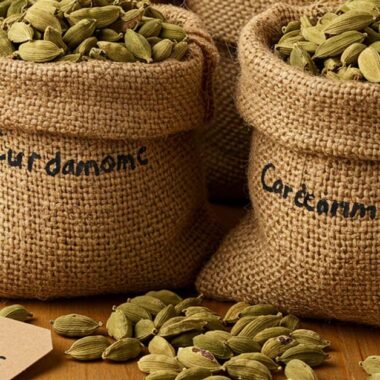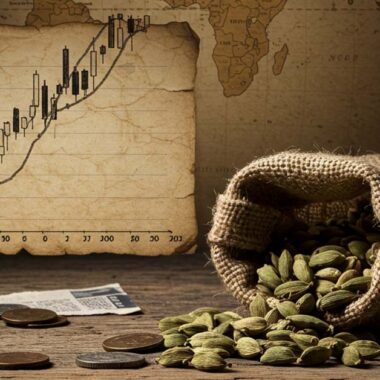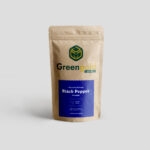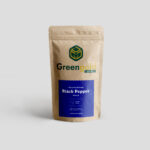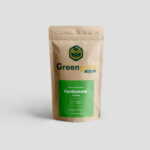Cardamom, often dubbed the Queen of Spices, is a spice of great economic importance. Its aromatic pods are prized globally for culinary, medicinal, and aromatic purposes. However, cardamom prices are highly volatile, and a major factor influencing these fluctuations is the export market. 🌱💰
Let’s dive into how the dynamics of export markets impact cardamom prices worldwide. 🌍📈
📦 The Global Demand for Cardamom
Cardamom is grown mainly in tropical countries like India, Guatemala, Sri Lanka, and others, but its export reaches markets across the globe, from the Middle East to Europe, North America, and Asia. 🌎
🌿 Factors Impacting Global Demand:
- Culinary Uses: Cardamom is essential in many cuisines, especially in Indian, Middle Eastern, and Scandinavian dishes, as well as in beverages like chai and coffee.
- Health and Wellness: Growing awareness of cardamom’s health benefits, such as aiding digestion and managing blood pressure, drives demand in health-conscious markets.
- Aromatics and Fragrances: The increasing use of cardamom in perfumes, essential oils, and cosmetic products also fuels demand, particularly in markets like the Middle East and Europe.
💰 How Export Markets Influence Prices
The price of cardamom is significantly influenced by the global demand for the spice. Let’s break down how export markets affect its price dynamics. 🌿
1. High Demand from Key Export Markets
Countries like the Middle East, Europe, and North America are major importers of cardamom. As these regions consume vast amounts of cardamom in cooking, traditional medicine, and wellness products, any increase in demand from these markets leads to a rise in prices. 📈
- Middle East: Cardamom is a staple in Arabian coffee and is used in a variety of dishes and desserts. As the demand here grows, prices increase.
- Europe and North America: Cardamom’s increasing popularity in health-conscious markets, especially for its antioxidant and digestive properties, leads to higher exports and rising prices.
2. Fluctuations in Supply from Producing Countries
The supply side of the equation also influences cardamom prices. When major producers like India and Guatemala face weather challenges, pest infestations, or low yields, the supply of cardamom decreases, pushing up the prices in the export markets. 🌿
- India: As the largest producer of cardamom, any weather extremes in India’s key growing regions (like Idukki in Kerala) can directly impact global prices. For example, if there is a monsoon failure or drought, it can lead to reduced output and higher prices.
- Guatemala: While a major exporter, Guatemala’s cardamom industry has also faced challenges from climate change, which can cause price increases in the global market.
3. Export Policies and Trade Agreements
Export regulations and policies set by producing countries also play a significant role in influencing prices. For example, if a producing country decides to restrict exports to manage domestic supply, this can create a shortage in global markets, driving up prices.
- India’s export policies: India, as the leading exporter of cardamom, has occasionally set limits on its cardamom exports to stabilize domestic prices, impacting global availability.
- Trade Agreements: When trade agreements are signed between producing countries and importing countries, they can result in favorable trade terms and possibly lower prices in export markets.
🏷️ Impact of Currency Exchange Rates
The value of the currency in producing countries can also affect cardamom prices in global markets. When the currency of a major producing country (like India or Guatemala) weakens against the US dollar or the Euro, cardamom becomes cheaper for foreign buyers, stimulating demand.
- Indian Rupee Depreciation: If the Indian Rupee weakens against the US Dollar, Indian cardamom becomes more affordable to global buyers, increasing demand and potentially pushing prices up due to the surge in exports.
📉 Impact of International Competitors
The competition between major producing countries also influences the global market price for cardamom. When new exporters like Vietnam or Nepal increase their production, it can provide more supply, potentially leading to price stabilization or even a decrease in prices.
- Guatemala’s rise in production has significantly increased its share of the global cardamom market, creating more supply and affecting global prices.
🌿 What Affects Cardamom Prices the Most?
🏆 Top Factors Influencing Cardamom Prices:
- Global Demand: High demand in key markets like the Middle East and Europe drives prices up.
- Weather Conditions: Any unusual weather patterns in India, Sri Lanka, or Guatemala can reduce supply, leading to price hikes.
- Export Restrictions and Policies: Government-imposed restrictions on cardamom exports can limit supply, pushing prices higher.
- Competition: New producers entering the market, like Vietnam or Nepal, can increase supply and impact price dynamics.
- Currency Fluctuations: Changes in currency values in producing countries influence global price levels.
🛒 Want to Buy Fresh Cardamom?
Are you looking for premium-quality cardamom for your culinary or health needs? We offer top-notch cardamom directly from the best regions, including Idukki, ensuring the finest flavor and aroma. 🌿💚
🌱 Conclusion
As we can see, export markets play a pivotal role in shaping the price of cardamom on a global scale. From demand and supply dynamics to currency fluctuations and export policies, a wide range of factors influence the cost of this highly sought-after spice. 🌍💰
With the continued growth in demand, particularly for organic cardamom, the future of the global cardamom market looks promising — though price fluctuations will always be a factor to consider. 🌿

